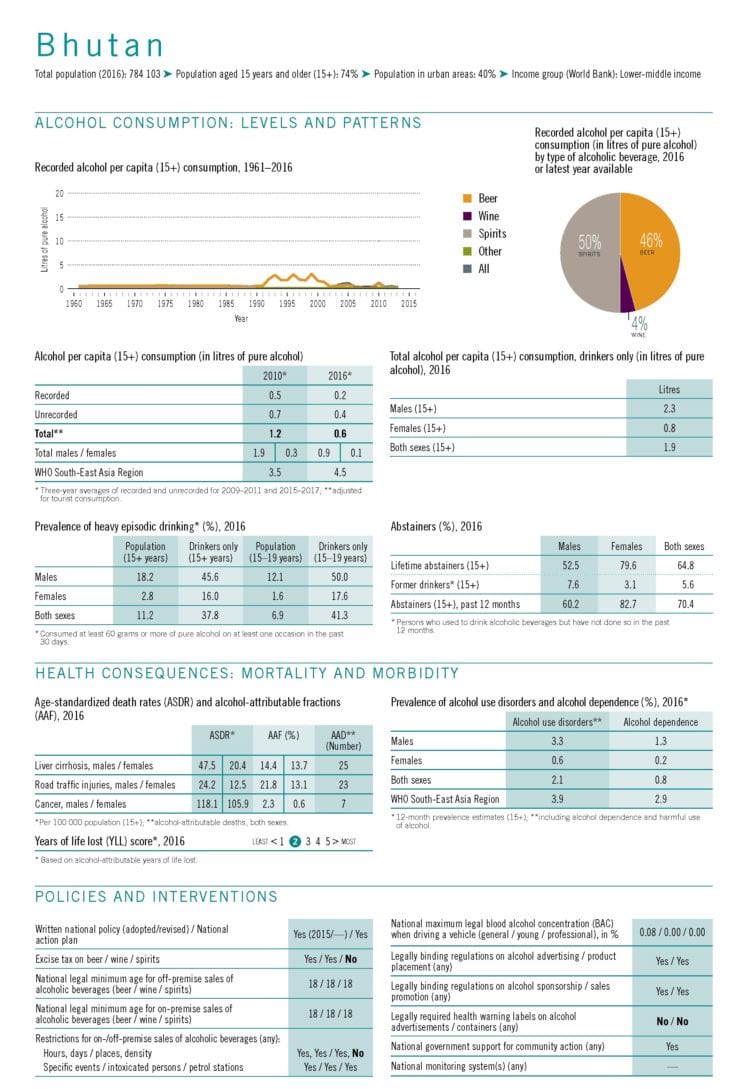Bhutan: Addiction Epidemic Hinders Development
In Bhutan a growing addiction epidemic is hindering the development of the country.
Bhutan is known globally for placing Gross National Happiness of its citizens above gross domestic product. However, the country is now struggling to maintain the well-being of their population in the face of an increasing substance use burden.
With growing exposure to alcohol and pain medication, addiction is now a major problem for Bhutan. A recent government report found:
- Alcohol causes 50% of the patient deaths in hospitals.
- Over 70% of suicide cases in the country are linked to alcohol and other drug addiction.
- A national survey in 2017 found that around two-thirds of university students use their pocket money to buy alcohol and other drugs.
- Over 10% of Bhutanese youth between 13 to 17 use marijuana. The country has one of the highest proportions using this drug in the WHO South East Asian region.
The heavy toll of harmful substances
The burden of harmful substances on Bhutanese society is huge. The country’s official statistics agency reports that the socioeconomic cost of alcohol amounted to 5 billion ngultrum, about $70 million, in 2014 – four times higher than the revenue generated by alcohol sales.

As recent WHO data shows, alcohol use prevalence is very low in Bhutan, with the vast majority of people 15+ years old abstaining from alcohol. But heavy episodic alcohol use among consumers is very high. And recent trends are going into the wrong direction, especially among youth and minors.
Lack of government action to address the problem
The Bhutanese public and health experts are of the opinion that while the government accepts and talks about the substance use problem, there is a lack of action to actually resolve the growing issues.
For example, the World Health Assembly adopted the WHO Global Alcohol Strategy in 2010 encouraging member states to improve alcohol policy implementation and formulation, across 10 areas of proposed action, among them community-led action. Bhutan did create a task force soon after, but it took 6 years for the government to approve the national agenda and to this day people are unaware if it is being implemented and if so whether is is effective.
We have policies and legislations, rules and regulations, but when it comes to implementation, I think we are not very effective,” said Damber K. Nirola, a doctor at the Thimphu Hospital, as per Foreign Policy.
Since opening up to the outside world, the country has been going through rapid changes over the past 6 decades. Exposure to alcohol and other drugs has rapidly increased but policy responses to control them remain too slow in implementation.
Domestic alcohol production and alcohol retail outlets have dramatically increased in recent years which is linked to the growing alcohol problem. Official figures suggest there is one bar for every 90 people. Meanwhile, the government produces hard liquor as well, 80% of which is exported.
The remaining 20% is also a major problem as many Bhutanese opt for locally made liquor which is cheaper than the imported brands. Furthermore, the revenue from alcohol does not cover the social and economic losses incurred as a result of alcohol-related harm, for example loss of productivity and premature deaths, according to the government’s own report.
In terms of drug addiction, the excessive use of prescription medicine is a growing problem. Here too there is lack of political will to find solutions. For example the Bhutan Narcotics Control Authority board members did not meet at all from 2014 to 2017.
Chencho Dorji, who was one of the only 4 psychiatrists in the country emphasized that community-based approaches to addiction and mental health treatment are the only way forward in a society that lacks resources, expertise, and government interest.
The government needs to take urgent action to implement the policies which are in existence and further strengthen these policies to better prevent and reduce harm from these substances and protecting the Bhutanese people.